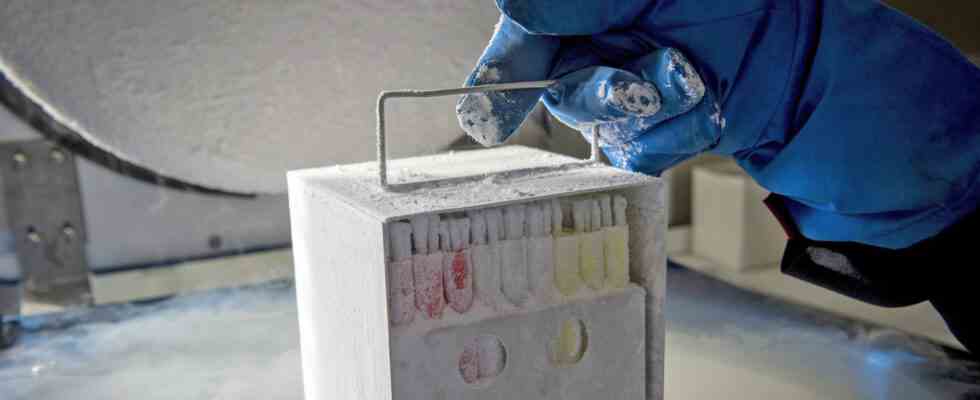Status: 08.04.2022 08:05 a.m
More and more women in the UK are donating their eggs to help others conceive. They do this for altruistic reasons – because there is hardly any money for it.
It took Alice Bisset several days to write a letter to her descendants. Now it’s locked up in an egg bank in London. “I wanted to do it right,” she says, “although I don’t know if anyone will ever read it.” Bisset donated some of her eggs. Unlike in Germany, this is possible in Great Britain – and is becoming increasingly popular. Human Fertilization & Embryology Authorization (HFEA) data shows births with a donor egg more than doubled between 2012 and 2019.
Egg banks report that readiness has further increased in the corona pandemic. The London Women’s Clinic performs 500 egg donations a year. Clinic boss Nick Macklon expects the number to double in the next one to two years.
The desire to help
And the motivation of the donors has also changed. Egg donation used to be mainly a “by-product” of artificial insemination: women could donate surplus eggs in exchange for reduced treatment costs. Today the majority of women in the UK donate for altruistic reasons, like Alice.
After being turned away from donating blood because of acne, she began looking for ways to donate. She found egg donation online, researched it and contacted the London Women’s Clinic.
An egg cell under the microscope. Donor eggs are retrieved in a procedure that more and more British women are opting for voluntarily.
Image: picture alliance / dpa
Hardly any money for the donation
About 15,000 women come to the London clinic each year alone with the desire to enable other couples to give birth. There is hardly any monetary incentive: Egg donations are not remunerated in Great Britain, there is only an expense allowance of 750 British pounds – the equivalent of around 900 euros.
Donors must be between 18 and 35 years old, undergo extensive health checks and be informed about the risks of the procedure. Because in order to be able to donate high-quality eggs and as many as possible, they have to give themselves hormone injections over a period of ten to eleven days. The egg cells are then removed in a 15 to 20 minute surgical procedure under general anesthesia.
“The medical risks are very low,” says clinic director Macklon. Initially, there were concerns that women’s ovaries and their fertility could be damaged in the long term. “But we’ve found that’s not a significant problem at all.”
Child’s right to contact
More challenging, says Macklon, is dealing with the legal framework for many women. Because egg donation is not anonymous in the UK. If a child is born of the donation, it has the right to contact the donor once it reaches the age of 18.
Elaine Chong appreciates this arrangement. She donated 11 eggs and later found out that a boy was born. Now she hopes that he will contact her as soon as he turns 18: “I’m so curious,” she says. “I would like to know how my DNA is doing out in the world.”
But Chong doesn’t feel like a mother: “I didn’t raise this child, I wasn’t pregnant,” she says. “He’s more like a nephew to me, or a cousin.”
No parental responsibility
The legal issue of motherhood is one of the main points for critics of egg donation in Germany. In the UK, by law, the woman who gives birth to a child is the only mother. “The donor donates her eggs, and that’s it,” says Macklon. “She has no parental responsibility and no right of access to her future children.”
In Germany, egg donation is prohibited under the Embryo Protection Act. As part of a family law reform, Federal Justice Minister Marco Buschmann (FDP) has announced that he will reform the law. Egg donation could be legalized.
Critics such as the “Feminist Women’s Health Center” in Berlin warn against commercialization: women should not decide to donate eggs because of economic hardship.
“You really have to want it”
As far as Alice Bisset is concerned, this concern is unfounded as long as it is only an expense allowance: this is justified because you have to take part of the work time during the treatment to go to health checks and the final procedure. The money is not enough for much more anyway.
Elaine Cong has a similar view: “You really have to want it,” she says. Instead of an achievement that should be compensated, she describes her donation as a “gift”: “I just wanted to help families feel complete.”

